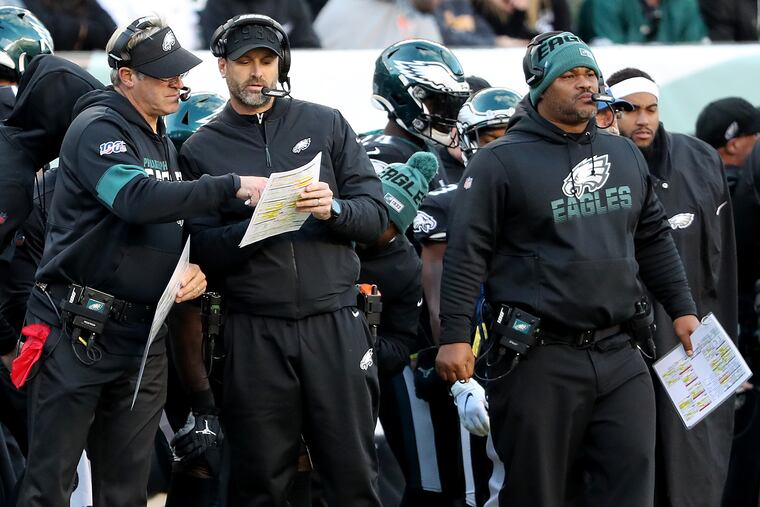The Eagles aren’t the NFL’s hot, new thing anymore. That matters, and it hurts. | Mike Sielski
Innovation usually has a pretty short half-life in the NFL, and the Eagles need to find a way to surprise opponents again.

In Dallas, the Cowboys are in first place in the NFC East, averaging 7½ more points per game than they did last year, and the savior of their season -- and perhaps of Jason Garrett’s head-coaching career -- isn’t Ezekiel Elliott or Amari Cooper or even Dak Prescott. It’s Kellen Moore: 31 years old, cherubic-faced, a rookie NFL offensive coordinator and play-caller.
In San Francisco, with quarterback Jimmy Garoppolo healthy and in sync with head coach Kyle Shanahan, the 49ers are 9-1, and their per-game scoring output is up by more than 8 points from last season, when Garoppolo missed 13 games because of a knee injury.
In Baltimore, the Ravens have gone 14-3 over the 17 games started by Lamar Jackson, whose speed, arm, and intelligence have made him the league’s most breathtaking player. Under Greg Roman, in his first season as their offensive coordinator, the Ravens are scoring more than 34 points a game, the highest mark in the NFL, and no one has figured out how to slow down Jackson, let alone stop him.
The Eagles used to be what these teams are now. They used to be one of the hot, new things in the NFL. They were that kind of team in 2017, when they surrounded Carson Wentz with better skill-position players, when they challenged conventional football thinking by going for it on fourth down in situations in which such risk-taking was considered verboten, when they contoured their offense to accommodate Nick Foles’ strengths after Wentz suffered his season-ending knee injury. They possessed and wielded a powerful advantage in this salary-cap era, when so many teams have comparable talent: Because of a significant change or changes in one or more of a few influential aspects of their team -- head coach, play-caller, quarterback, philosophy -- they were employing a scheme or strategy that was, at the time, unfamiliar to their opponents.
“A hundred percent right,” wide receiver Jordan Matthews said. “It’s a game of inches. There’s so close a margin for error that the element of surprise or something that’s not able to be game-planned for obviously helps out a team.”
Before re-signing with the Eagles last week, his third stint with them, Matthews had been on the 49ers roster earlier this season, playing three snaps in one October game. But even that brief stint was enough for him to notice that teams weren’t yet picking up Shanahan’s play-calling tendencies or recognizing formations. The edge for the 49ers was as much psychological as it was tactical. “There a saying in the NFL that sometimes change is just as good as winning,” Matthews said. “Winning and execution breed a little momentum, and sometimes energy permeates through a whole locker room, and you get a few wins, and before you know it, you’re on a roll.”
Eventually, though, the roll slows (unless you’re Bill Belichick, Tom Brady, and the Patriots). Eventually, coaches spend enough time studying enough film to catch up to what those once-innovative and slightly mysterious teams have been doing.
Chip Kelly set the NFL on fire when he arrived in Philadelphia, and it burned for a season-and-a-half before it seemed that, overnight, every other team had found a hose. A year ago, Sean McVay was still regarded as a wunderkind coach, and the Rams hadn’t yet signed Jared Goff to a contract that would reportedly guarantee him $110 million, more than any player in league history. Now, the Rams are averaging 0.7 fewer yards per play and scoring 9.0 fewer points per game this season than they did last season, and it’s fair to wonder whether Goff is a bona fide franchise quarterback or the fortunate beneficiary of having played against defensive coordinators who didn’t know what was coming.
“You have to always stay one step ahead of the posse, if you will,” Eagles offensive coordinator Mike Groh said, “whether you’re talking about those critical situations or your general offensive structure. [You’re] trying to do things differently but still maintain the same order for the guys who are here so that you’re not remaking yourself all the time. You have to find new and fresh ways to do old things.”
Since winning the Super Bowl, the Eagles have struggled to meet that challenge. They scored 28.5 points a game in 2017, then fell to 22.9 last season and 23.4 this season, and their average yards per play through 10 games, 5.1, is their lowest since 2016, Doug Pederson’s first season as head coach.
If you want to blame Wentz for that regression, if you want to argue that he should have improved enough over time (after tearing up his knee and breaking a bone in his back) to make up for any and all of the Eagles’ injuries and roster deficiencies, blame away. You’re unlikely to be persuaded otherwise. Just bear in mind: Injuries to DeSean Jackson, Alshon Jeffery, Lane Johnson, and others don’t hamper Wentz and the offense merely by removing the unit’s most talented and important players. Those absences make it more difficult for Pederson and Groh to diversify their schemes and play-calling, because the backups now forced into action don’t necessarily have the skills and experience to master the system quickly and thrive in it.
If you’re looking for a reason that the Eagles have brought back so many players who were previously here -- Jackson, Matthews, Darren Sproles, Jay Ajayi -- that might be it. “I have a pretty solid knowledge of this playbook,” Ajayi said Tuesday. “There’s not a lot that’s changed.” Maybe that’s the problem. Maybe a lot more should.